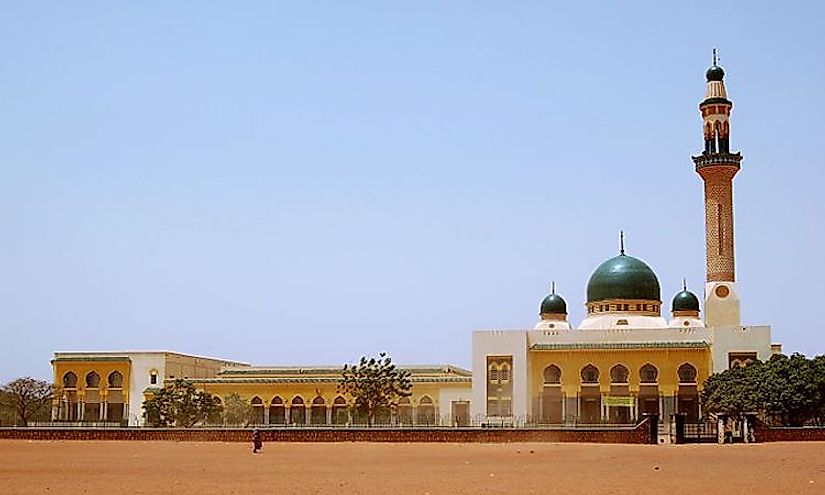Religious Beliefs In Niger

The country of Niger is located in Western Africa and is a landlocked country where over 80% of the land is covered by the vast Sahara Desert. The country is named after the mighty Niger River which flows right through the capital city of Niamey in the southwest part of the country. Niger is a country that over the centuries has had its original traditional religions, but also had Islam, and later Christianity introduced to the country through outside forces.
The Major Religious Beliefs In Niger
Shiite and Sunni Islam
Shiite Islam is the second largest religion in Niger, with 6.5% of the population adhering to the religion, while Sunni Islam is by far the largest religion in the country of Niger, with a massive 81.1% of the population following the religion. Islam first came into the region that is now Niger at the start of the 15th century with the expansion of the Songhai Empire (1375-1591) and the influence of the Trans-Saharan trade across North and West Africa. Despite being in Niger for a few hundred years Islam did not become the dominant religion under the 18th and 19th centuries when the Hausa and Zarma people were influenced by the Fula led jihads of the Sufi brotherhoods. Over the 20th century the Tijaniya, Hammallism and Sanusiya sects of Islam have gained brief importance in the country. Currently, the Senegalese Nyassist Sufi teachings and the Arab Wahhabite teaching having gained a small number of converts in the country.
Hausa Animism and Other Traditional African Religions
The number of people in Niger that follow a Traditional African Religion is 5.9%, with Hausa Animism being the most notable one. There are Traditional African Religions like the Hausa-speaking Maori community in Dogondoutci or the Kanuri speaking Manga near the City of Zinder who both practice different forms of the pre-Islamic version of the Hausa Maguzawa religion. Other Traditional Africa Religions like Hausa Animism (Bori) are practiced by syncretic Muslim communities as a mix of Islam and traditional religion. Hausa Animism is noted for its belief in spiritual possession and controlling spirits through a ritual or song and dance know as adoricism
Ahmadiyya Islam
The number of people in Niger who follow Ahmadiyya Islam is currently 5.6% of the population. Ahmadiyya Islam is a recent Islamic religious movement having been established in Punjab, India, at the end of the 19th century. The religion did not arrive in Niger until 1956 and is the most recent of the major beliefs in the country. Ahmadiyya's believe that Islam as a religion is the last dispensation for humanity as was revealed to the Prophet Muhammad and that they must restore it to its true form and teaching as it was under Muhammad and the early Islamic community.
Protestant and Roman Catholic Christianity
The number of Roman Catholic followers in Niger is only 0.1% of the population, with the number of Protestants being only slightly larger at 0.4%. Christianity was brought to Niger by Europeans in the 19th century when the French and the Germans were among the first to explore the area. By the 1890s the French had control of parts of Niger and eventually established the French Colony of Niger (1922-1960). Shortly after this in 1924 and 1931, the first Protestant and Catholic missions were set up in the country along with other French colonial institutions. Most Christians in the country live in and around the major urban centers of the country like Niamey or Maradi. Most Christians in the country are local believers who are descended from colonial families or are immigrants from other coastal countries like Togo or Benin.
The State Of Religion In Niger
The constitution of Niger provides freedom of religion for the population and other policies and laws also help to promote this. Important societal leaders in the country promote religions freedom and Niger has mostly had positive relations between its Islamic majority and other religions. The government of the country is able to see that Islam is the religion of the vast majority of the country, but they also have secular law and do not directly fund any religion. While there are been violent attacks like the November 2000 riots in Niamey due to a French run fashion show or the January 2015 attacks on French linked business due to the Charlie Hebo magazine the government has been quick to crackdown on religious intolerance and banning and arresting member of such groups.
Religious Beliefs In Niger
| Rank | Belief System | Share of Population in Niger |
|---|---|---|
| 1 | Sunni Islam | 81.1% |
| 2 | Shiite Islam | 6.5% |
| 3 | Hausa Animism and Other Traditional African Religions | 5.9% |
| 4 | Ahmadiyya Islam | 5.6% |
| 5 | Protestant Christianity | 0.5% |
| 6 | Roman Catholic Christianity | 0.1% |
| Other or No Beliefs | 0.3% |











